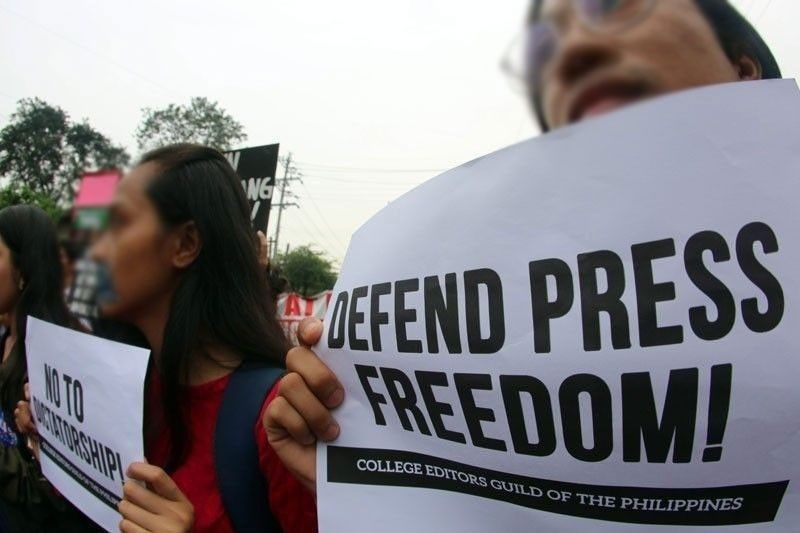Palace downplays dip in press freedom rank

MANILA, Philippines — Malacañang yesterday downplayed and disputed the Philippines’ lower ranking in the press freedom index and advised journalists not to be onion-skinned if President Duterte responds to reports critical of him.
The Philippines fell two notches in the World Press Freedom Index, the fourth time it got a lower ranking on the list. It ranked 138th out of 180 countries this year, lower than its 136th ranking last year, according to a report released by press watchdog Reporters Without Borders (RSF). The country placed 134th in 2019 and 133rd three years ago.
RSF cited the non-renewal of the franchise of broadcast giant ABS-CBN and what it described as a “grotesque judicial harassment campaign” against news website Rappler.
“Well, first, it’s just two notches lower. It’s de minimis, meaning it does not say much,” presidential spokesman Harry Roque said at a press briefing.
Roque said the Philippines still ranked fourth among Southeast Asian countries ahead of Myanmar, Cambodia, Brunei, Singapore, Laos and Vietnam.
He, however, claimed that the issues involving ABS-CBN and Rappler should not have been considered in the Philippines’ ranking.
“We see nothing wrong with it but of course, we dispute also the ranking because Reporters Without Borders considered as affront to press freedom the Rappler issue, because we know it was a decision made by (officials of) SEC (Securities and Exchange Commission) who were not appointed by President Duterte,” Roque said.
The Palace spokesman was referring to the revocation of Rappler’s operating license over alleged violation of foreign equity provisions in the Constitution, an allegation that the news website has denied.
“The same with ABS-CBN, which we all know is required to have a franchise,” Roque said.
“So, we also dispute that these two issues should have not led to the decline in our ranking,” he added.
Last July, the House legislative franchises committee rejected a bill that would have given ABS-CBN a fresh franchise, a move widely seen as an attack on press freedom. The shutdown has forced the network to lay off thousands of its workers while the Philippines is struggling with the impact of the COVID-19 pandemic.
Roque said Duterte is aware of the role of the media and allows journalists to perform their work.
“Our message to the media is if there are harsh criticisms against the President, sometimes, the President also comes up with a harsh response,” Roque said in Filipino.
“In the same way that we expect the President not to be onion-skinned, the media should not be onion-skinned when the President responds,” he added.
‘Phl still fares well’
Presidential Task Force on Media Security (PTFoMS) executive director Joel Sy Egco said despite notable declines in 73 percent of all countries in the world, the Philippines still fared well, adding that “an indication that compared to previous administrations, press freedom under President Duterte remains freer and better.”
While noting a slight two-point drop in the WPFI, the country’s rankings in the index for the past five years remained generally better than during the term of former president Benigno Aquino III in spite of the onslaught of the COVID-19 pandemic, Egco said.
“So far, President Duterte’s lowest grade is Aquino’s highest. It is high time to set the record straight, there is no shrinking space for media in the Philippines based on this year’s World Press Freedom Index of the RSF,” Egco said.
Citing the pandemic as main reason, RSF said that press freedom was “totally blocked or seriously impeded in 73 countries and constrained in 59 others,” most notably in Malaysia where an anti-fake news law and arrests of journalists led to a massive 18-point decline.
According to RSF, this year’s “index data reflect a dramatic deterioration in people’s access to information and an increase in obstacles to news coverage” pointing out that the “coronavirus pandemic has been used as grounds to block journalists’ access to information sources and reporting in the field.”
PTFoMS believes that RSF’s index proves beyond doubt the media environment in the country “has generally improved since 2009, especially after President Duterte came to office.”
- Latest
- Trending


























